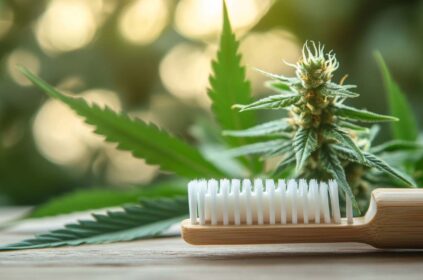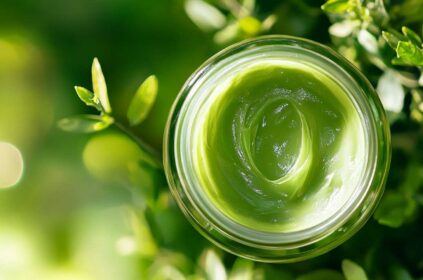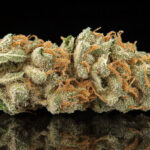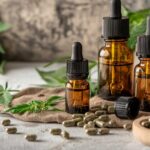In recent years, cannabidiol, commonly known as CBD, has surged in popularity not just as a wellness aid but as a powerful ally for skin health. Derived from the cannabis plant, CBD has found its way into a variety of skincare products, enticing consumers with the promise of clearer skin and relief from various dermatological conditions. As the American market continues to lean towards natural and holistic approaches to wellness, the need to understand how CBD interacts with our skin and its therapeutic potential is more important than ever.
The Science Behind CBD and Skin Health
At its core, CBD’s efficacy in skincare is rooted in its interaction with the body’s endocannabinoid system (ECS). This system plays a pivotal role in maintaining homeostasis and regulates numerous functions, including those related to skin health. Importantly, our skin contains cannabinoid receptors, which enables CBD to exert its effects directly on skin cells.
How exactly does this interaction manifest? Let’s break it down into a few key aspects:
- Anti-Inflammatory and Antibacterial Properties: One of the standout features of CBD is its potent anti-inflammatory properties. It’s well-documented that inflammation is a major contributor to skin issues such as acne and eczema. CBD can soothe inflamed skin, significantly reducing redness and irritation. Coupled with its antibacterial properties, CBD helps combat the bacteria responsible for acne, allowing for clearer, healthier skin.
- Regulation of Sebum Production: For individuals struggling with acne, one of the key challenges is excessive sebum production. When the sebaceous glands produce too much sebum, it can clog pores and lead to breakouts. Fortunately, research indicates that CBD can inhibit this overproduction, helping to balance oil levels in the skin and prevent future blemishes.
- Antioxidant Properties: CBD is also rich in antioxidants, which are essential for protecting the skin from environmental stressors such as pollution and UV radiation. These free radicals can accelerate aging and contribute to skin conditions. By incorporating CBD into your skincare routine, you can potentially bolster your skin’s defenses and promote a more youthful appearance.
Topical Applications of CBD for Skin Health
When it comes to applying CBD to the skin, there are two main methods: topical and transdermal.
- Topical CBD: This includes lotions, creams, and serums that provide localized relief. These products absorb into the skin through hair follicles, allowing CBD to interact directly with skin cells. Utilizing topical products is especially beneficial for mild physical discomfort, soreness, and targeted skin conditions.
- Transdermal CBD: While less common in skincare, transdermal applications deliver CBD to deeper layers of the skin and into the bloodstream. This may be more suitable for systemic issues, but for skin-specific concerns, topical applications are typically the go-to choice.
The Benefits of Topical CBD for Acne
Topical CBD has proven to be a game changer for many people grappling with acne. Here’s how it works:
- Reduced Inflammation: Applying CBD oil or creams directly to affected areas can diminish the inflammation associated with acne breakouts.
- Balanced Oil Production: With its ability to regulate sebum production, CBD helps maintain a balanced skin environment, thus minimizing the risk of clogged pores.
- Combined Approach: For enhanced outcomes, consider using topical CBD in conjunction with oral supplements. This dual strategy can optimize the effectiveness of your skincare regimen.
Exploring Other Skin Conditions
It’s not just acne that CBD has shown promise in addressing. Other skin conditions like eczema, psoriasis, and rosacea often stem from inflammation and irritation—areas where CBD shines. Its soothing properties can help alleviate the redness and discomfort associated with these conditions, promoting healing and restoring balance to the skin.
Effectiveness and Safety Considerations
While anecdotal evidence abounds, the scientific community is still exploring the full spectrum of CBD’s benefits in dermatology. Initial studies have yielded promising results, demonstrating CBD’s ability to reduce inflammation, limit oil production, and exhibit antibacterial effects—all favorable elements in fortifying skin health.
Safety is of utmost importance. Generally, CBD is considered safe for topical use. However, it is crucial to select high-quality products designed specifically for skincare, free from THC and other unwanted contaminants. Verifying the purity of the CBD within the formula can significantly reduce any chances of adverse reactions.
How to Use CBD for Skin Health
To effectively harness the benefits of CBD for your skin, consider the following steps:
- Selecting the Right Product: Choose formulations that are designed for skincare. Topical creams, serums, and oils made from pure CBD are ideal. Avoid products with added fillers that may dilute the efficacy.
- Application Tips:
- Apply directly to the areas of concern for localized relief.
- Use a generous amount to ensure adequate absorption, as CBD’s effectiveness can diminish if inadequate amounts are used.
- Consider integrating oral CBD supplements into your routine for synergistic benefits.
In conclusion, CBD has positioned itself as a promising natural remedy, particularly for acne and other skin conditions. Its anti-inflammatory, antibacterial, and antioxidant properties make it a worthwhile addition to a skincare regimen.
Actionable Takeaways:
- Incorporate CBD into Your Skincare Routine: Seek high-quality topical products to treat specific skin issues such as acne, eczema, or rosacea.
- Combine Approaches for Best Outcomes: Leverage both topical and oral CBD for comprehensive skin health benefits.
- Prioritize Quality: Always opt for products that are vetted for purity, ensuring they are free from THC and contaminants.
With a deeper understanding of CBD’s interactions with the skin and its potential benefits, you can confidently consider integrating CBD into your skincare routine, potentially leading to clearer and healthier skin.





















